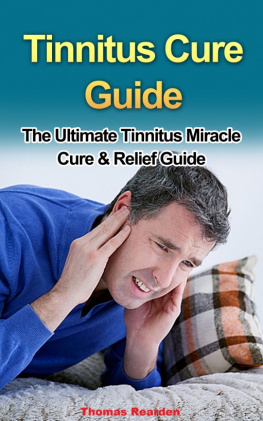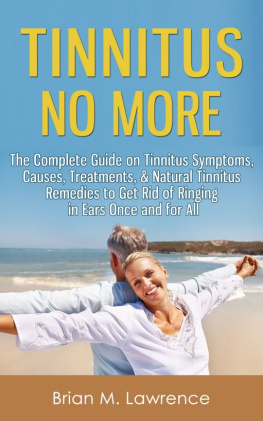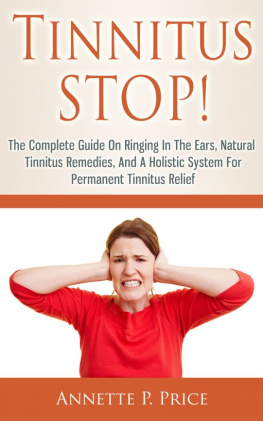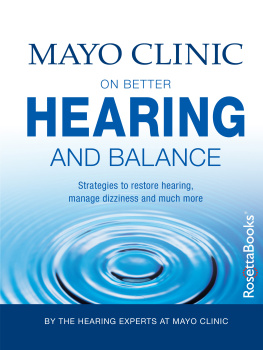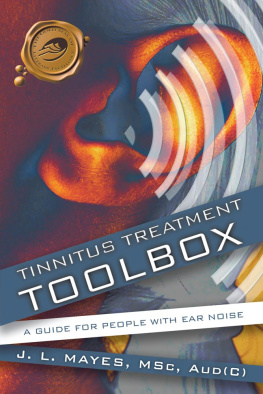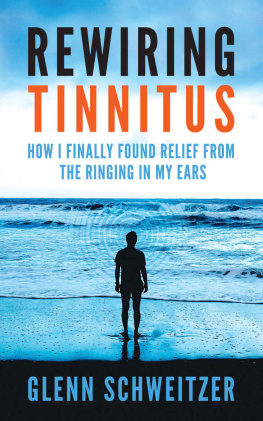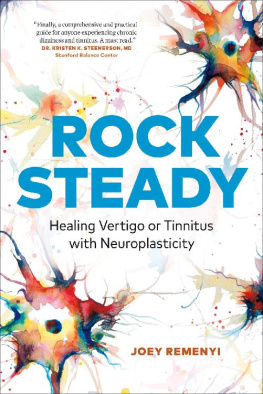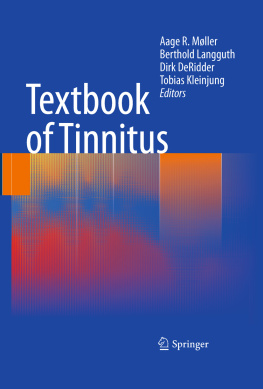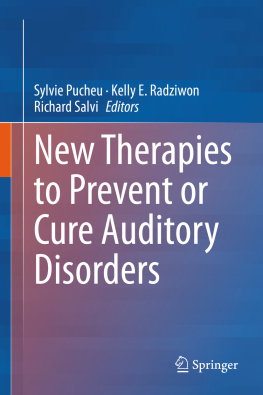Tinnitus Cure Guide
The Ultimate Tinnitus Miracle Cure and ReliefGuide
by
Thomas Rearden
Copyright 2015 Thomas Rearden
Smashwords Edition
Table of Contents
Introduction
Chapter 1 Tinnitus A General Overview
Chapter 2 Conventional Treatment Strategies forTinnitus
Chapter 3 Treating Tinnitus with Herbal Remedies
Chapter 4 Other Natural Treatments
Introduction
I want to thank you andcongratulate you for downloading the book, Tinnitus Cure Guide :The Ultimate Tinnitus Miracle Cure & Relief Guide
This book contains provensteps and strategies on how to cure tinnitus or ringing in theears.
Tinnitus or ringing in theears is defined as the sensation of hearing whistling, chirping,hissing, buzzing, ringing, or other sounds. The noise can becontinuous or intermittent and can differ in loudness. It isusually worse when there is low background noise, so people aremore aware of it at night when trying to fall asleep in a quietroom. In some rare cases, the noise occurs simultaneously with theheartbeat, a condition known as pulsatile tinnitus.
Tinnitus is very widespread.In fact, it affects approximately 50 million adults in the UnitedStates. For many people, tinnitus is simply an annoyance. However,in severe cases, the condition may cause people to have difficultyin sleeping or concentrating. The condition may even interfere withpersonal relationships and work, leading to psychologicalstress.
This book featurescomprehensive information about tinnitus, its causes, symptoms,complications, and risk factors. This information will help you tobetter understand the nature of the condition.
Chapter 1: Tinnitus AGeneral Overview
Tinnitus (pronounced asTIN-ih-tus) is ringing or noise in the ears. It is a widespreadproblem affecting 1in every 5 people. Tinnitus in itself is not acondition. It is in fact, considered as a symptom of an underlyinghealth condition including circulatory system disorder, ear injuryor age-related hearing loss.
While bothersome, tinnitustypically is not an indication of something serious. Although itcan get worse with age, for majority of people, ringing in the earscan be reduced with treatment. Addressing a known underlying causewill help most of the time. Other treatment strategies conceal orlessen the noise, making tinnitus less noticeable.
What CausesTinnitus
There are several healthconditions that can cause or aggravate tinnitus. In majority ofcases, an exact cause is never discovered.
Inner cell damage is one ofthe most common causes of tinnitus. Small, sensitive hairs found inthe inner are move depending upon the pressure of sound waves. Thiscauses the ear cells to produce an electrical signal through anerve found in the ear (called the auditory nerve) which goes tothe brain. The brain then transforms these signals into sounds. Ifthe hairs located inside the inner ear are broken or bent, they cansend random electric signals to the brain, leading totinnitus.
In most people, tinnitus isbrought about by any of the following health conditions:
Ear bone modifications osteoclerosis or the stiffening of the bones found in the middleear may have an impact on hearing and lead to tinnitus. Thiscondition is caused by an abnormal growth of the bones whichappears to be hereditary.
Earwax buildup earwaxsafeguards the ear canal by slowing bacterial growth and trappingdirt. When excessive earwax builds up, it tends to become too hardto naturally wash away, causing irritation of the eardrum orhearing loss, which can cause tinnitus.
Exposure to loud noise loud noises including those from firearms, chain saws and heavyequipments are common sources of noise-associated hearing loss.Portable music devices such as iPods or MP3 player can alsocontribute to noise-related loss of hearing if played too loud forlong periods. Tinnitus brought about by short-term exposure,typically goes away while a long period of exposure to loud soundcan lead to permanent damage.
Age-related loss of hearing for a lot of people, hearing weakens with age, typicallybeginning at the age of 60. The loss of hearing may lead totinnitus. Presbycusis is the medical term used to refer toage-related hearing loss.
Other Causes ofTinnitus
Some of the less commoncauses of tinnitus include the following:
Acoustic neuroma this isa type of benign (noncancerous) tumor which develops on the cranialnerve. The tumor runs from the brain to the inner ear and controlshearing and balance. This condition is also commonly referred to asvestibular schwannoma and generally leads to tinnitus in only oneear.
Neck or head injuries neck or head trauma can have an effect to the inner ear, brainfunction or hearing nerves associated to hearing. These injuriesgenerally lead to tinnitus in only a single ear.
TMJ problems problemswith the TMJ or temperomandibular joint, which is a the joint foundon either side of the head just in front of the ears, where thelower jawbone meets the skull, can lead to tinnitus.
Menieres disease tinnitus could be an early sign of Menieres disease which is adisorder of the inner ear that may be caused by an abnormalpressure of the inner ear fluid.
Blood vessel problemsassociated with tinnitus
In some rare cases,tinnitus is brought about by a disorder of the blood vessel. Thisparticular type of tinnitus is commonly referred to as pulsatiletinnitus. The causes of pulsatile tinnitus include thefollowing:
Malformation of capillaries a condition referred to as arterio-venous malformation or AVMwhich is characterized as abnormal connections between the arteriesand the veins, can lead to tinnitus. This particular type oftinnitus typically takes place in only one year.
Turbulent blood flow kinking or narrowing in the carotid artery (neck artery) or jugularvein (vein in the neck) can lead to irregular, turbulent blood flowcausing tinnitus.
High blood pressure levels hypertension as well as other factors that increase high bloodpressure levels such as caffeine, alcohol and stress can maketinnitus more noticeable.
Artherosclerosis with ageas well as the accumulation of cholesterol and other types ofdeposits, major blood vessels near the inner and middle ear losesome of their elasticity the ability to expand or flex slightlywith every heartbeat. This causes more forceful blood flow, whichmakes it a lot easier for the ear to detect the heartbeats. Ingeneral, you can hear this kind of tinnitus in bothears.
Neck and head tumors atumor that places pressure on the blood vessels in the neck or head(vascular neoplasm) which can lead to tinnitus as well as othersymptoms.
Medicines that cancontribute to tinnitus or ringing in the ears
There are some types ofmedications which can aggravate or cause tinnitus. In general,higher dosages of these medicines will only aggravate tinnitus.Usually, the annoying noise diminished when you discontinue the useof the medication. The following are some types of medicationswhich are known to aggravate or cause tinnitus:
Aspirin, when taken inuncommon high dosages (typically about 10 or more daily)
Some types ofantidepressants may aggravate tinnitus
Quinine medications whichare used for the treatment of malaria as well as other healthproblems
Diuretics or water pillssuch as furosemide, ethacrynic acid or bumetanide
Medications for thetreatment of cancer such as vincristine andmechlorethamine
Antibiotics such asneomycin, vancomycin, erythromycin and polymixin B
Tinnitus Test andDiagnosis
To properly diagnosetinnitus, the physician will examine the neck, head and ears tolook for potential causes of tinnitus. Common tests to be orderedby the doctor will include:

